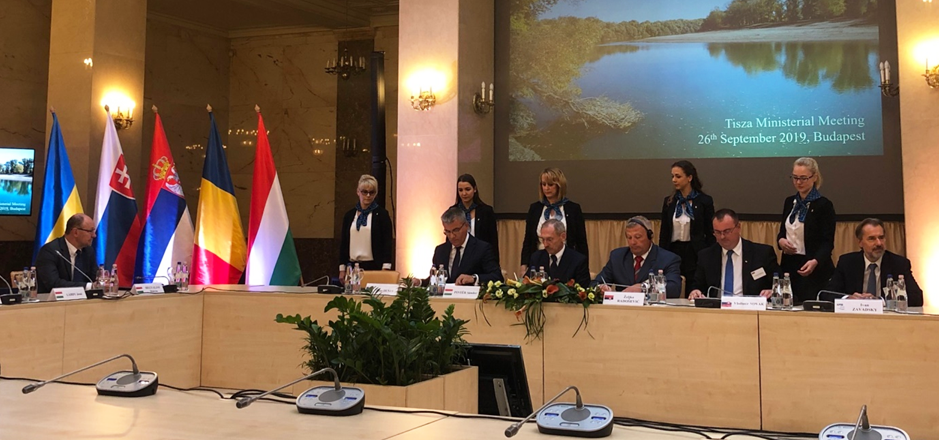Describe your organisation, its vision and mission.
The main task of the Tisza Office is the coordination of Tisza issues at national level in partnership with the International Commission for the Protection of the Danube River (ICPDR), the Secretariat of the Danube Region Strategy Ministerial Commissioner of the Ministry of Foreign Affairs and Trade, the River Basin Management and Water Protection Department of the Ministry of Interior, the General Directorate of Water Management, different departments of KÖTIVIZIG and other Hungarian and foreign partners.
Tisza Office initiates and participates in the realisation of projects, it coordinates the international relations of KÖTIVIZIG, it is responsable for the organisation and realisation of programmes of incoming and outgoing professional delegations and it provides translation and interpretation.
Together with the General Directorate of Water Management of Hungary (OVF), KÖTIVIZIG, including Tisza Office was responsable for the realisation of the JOINTISZA Project, which resulted in the Integrated Tisza River Basin Management Plan. All of the Tisza countries (Ukraine, Romania, Slovakia, Hungary and Serbia) took part in the preparation and implementation of the project from 2017 to 2019.
In September 2019, representatives of the 5 Tisza countries signed the Tisza Memorandum of Understanding (see the top photo), strenghtening the cooperation among the interested parties. In the Memorandum, Hungary offered the contribution of Tisza Office in Tisza-related international issues.
A detailed presentation of the Tisza Office is available here
How long has Tisza been a GWP partner?
Our Directorate has been cooperating with GWP Central and Eastern Europe for more than ten years, and since then our cooperation has deepened, covering many areas.
Of particular importance is the professional assistance we received during the implementation of the JOINTISZA Project and the support provided last year in the preparation of the application to be prepared and submitted by the countries of the ICPDR Tisza Group to be announced by the EU INTERREG Danube Transnational Programme in 2021.
Last year, KÖTIVIZIG also participated in GWP’s Water ChangeMaker Awards. This was useful for us because it helped to summarize, synthesize and rethink our international project activities, enabling new directions for the development of these activities.
What are the benefits of being a GWP Partner?
For us, the cooperation with GWP is a link to the global water policy issues, which enables us to learn about the latest trends and directions, and contributes to expanding our knowledge on water policy issues that strongly affect our region, be it water scarcity, cross-border water bodies or as a matter of common concern, pending an examination of the effects of climate change on water management.
We hope that the active and continuous cooperation between our organisations will be further strengthened in the future to the satisfaction of both parties.
Please share a challenge facing the management of water resources in your area of expertise.
To set the scene (2022) and assess the status of the Tisza River Basin by:
- assessing the progress reached by the implementation of the Joint Programme of Measures;
- assessing the quality of the Tisza River and its tributaries via implementation of the Joint Tisza Survey 2 (JTS2)
To set up a water-balance for the Tisza and its tributaries built on the outcomes of ICPDR water balance activity
- via calculating the water resource availability of surface waters – a) Current baseline situation assessment using the ICPDR method developed for the Danube Basin; b) Pi-lot study on determination of water scarcity and water sharing counter-interest indica-tors; c) Pilot study on application of economic instruments in addressing counter-interests in allocation of scarce water resources;
- via calculating the water resource availability of groundwaters;
- developing a pilot study to model possible challenges of water demands in case of effects of possible climate change scenarios.
To suggests policy recommendations towards a balanced water resource management for the Tisza River Basin and mitigation of impacts of flash floods, drought and scarcity. For this, we need to take into account the feasible climate change scenarios; the legal background of the sub-basin (national and international context); the socio-economic developments (main stakeholders of the sub-basin) and possible climate change impacts.
Are there any special projects or initiatives that you would like more widely known?
We are currently working on the JOINTISZA 2.0 project, which contains a number of elements that can be used to strengthen the cooperation of the Tisza River Basin countries in the field of water management, and through this we can also contribute to the overall improvement of the Central and Eastern European countries concerned.

